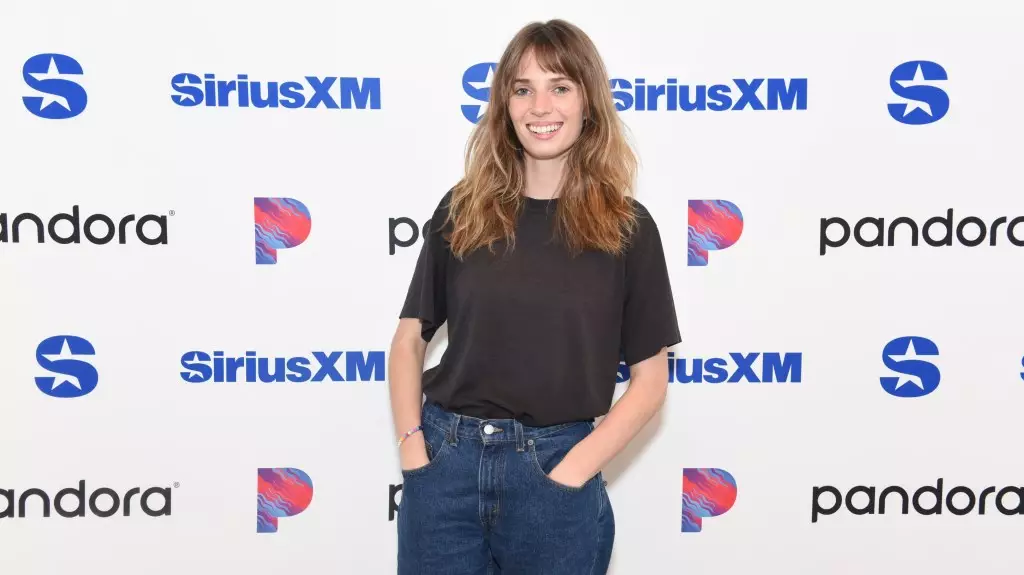In the world of filmmaking, few conversations are as timely and necessary as those that revolve around the role of social media in determining the careers of actors. Maya Hawke, best known for her role in Netflix’s acclaimed series “Stranger Things,” recently shared her insights on this topic during an appearance on Josh Horowitz’s “Happy Sad Confused” podcast. Through her candid remarks, Hawke highlights the complications many actors face in a rapidly evolving industry landscape where social media presence often outweighs traditional talent assessment.
She articulates a dilemma that many aspiring and established actors encounter—how to balance authenticity with the pressures of maintaining a public persona dictated by follower counts on platforms like Instagram and TikTok. For Hawke, this balance feels particularly disorienting. She underscores a fundamental difference between being an artist and being a celebrity, asserting her desire to be recognized primarily for her work rather than her online presence. This distinction is vital, as it underlines the struggle between artistic integrity and the commercialization inherent in modern filmmaking.
Hawke’s comments expose a double-edged sword—it’s clear that social media can amplify one’s visibility and, subsequently, career opportunities. However, she expresses her resentment for the platforms, referring to Instagram as a medium she “doesn’t care about” and even labeling it as “sucks.” Many in the industry may resonate with her view, given that casting decisions increasingly hinge on the star power generated through digital followings. There is an irony here; the platforms designed to promote creativity and authentic self-expression can sometimes transmute into tools of commodification, reducing true artistry to a metric of marketability.
The insight provided by Hawke’s discussion serves as a crucial reminder that navigating social media is not merely about self-promotion but rather about strategic survival in an industry now heavily influenced by algorithm-driven engagement. Hawke reflects on conversations with various seasoned directors urging her to maintain her online presence. They reveal that casting directors often face pressures from producers insisting on a specified number of followers among their cast—criteria that might otherwise seem trivial to those emphasizing artistic capabilities over visual statistics.
Yet amid these pressures lies a poignant observation about the deeply personal journey of an artist. Hawke notes that her pursuit of sincere artistic expression often feels at odds with the demands of a digital world that requires constant engagement. The constant evolution of social media is a challenge that can lead to feelings of isolation, as this generation of talent finds themselves straddling two worlds: one rooted in authentic artistry and another forging identity through curated online personas. Judging actors solely on their online presence can overshadow the profound complexities of their craft.
Furthermore, she offers a glimpse into the challenges of finding collaborations that align with her artistic vision, especially when many producers seem more concerned about capturable social media appeal than the art itself. This ongoing tension highlights a larger question: can genuine creativity thrive in an environment increasingly characterized by performative outreach and follower counts?
Despite her frustrations, Hawke remains hopeful for a balance between authenticity and necessary adaptation to industry changes. She acknowledges that even a few distinguished directors retain the privilege to create separated from social media metrics, hinging their legacy on established reputations rather than fleeting trends. The admiration she has for these figures illustrates the creative aspirations shared by many in the industry: the desire to create meaningful work that resonates on a deeper level with audiences worldwide.
As she continues to navigate the complexities of this contemporary landscape, Hawke embraces the reality that her relationship with social media will provoke questions throughout her career. This ongoing exploration embodies the essence of an artist’s journey—constantly reevaluating what it means to be not just a celebrity in the public eye but a storyteller with a profound commitment to the art they create. Ultimately, the evolution of the film industry necessitates embracing change while staunchly advocating for the art form’s authenticity, a balance artists like Maya Hawke are striving to maintain.

